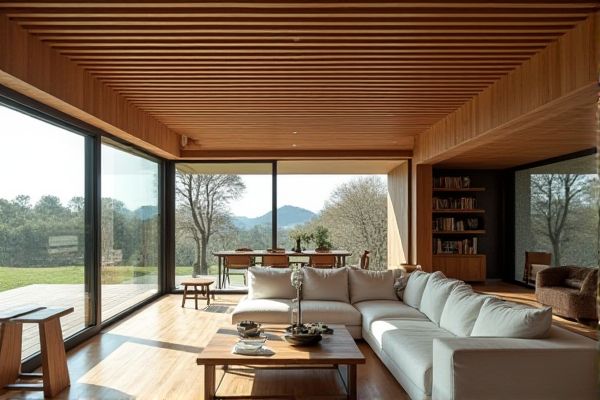
Slatted roofs consist of fixed, parallel slats that provide partial shade and ventilation, while louvered roofs feature adjustable slats that can be tilted to control sunlight and airflow more precisely. If you're considering which option best suits Your outdoor space, explore the full article to understand the benefits and functionality of each roof type.
Table of Comparison
| Feature | Slatted Roof | Louvered Roof |
|---|---|---|
| Design | Fixed horizontal slats | Adjustable louvers |
| Control | No adjustability, fixed panels | Manual or motorized angle control |
| Light Control | Limited, fixed light entry | Flexible light and shade management |
| Ventilation | Minimal unless slats are spaced | Optimized airflow with adjustable louvers |
| Weather Protection | Partial; no rain protection | Effective rain and sun shielding when closed |
| Maintenance | Low maintenance, simple cleaning | Requires periodic adjustment and cleaning |
| Cost | Generally lower | Higher, due to mechanism complexity |
| Usage | Ideal for consistent partial shade | Suitable for adaptable outdoor living spaces |
Introduction to Slatted and Louvered Roofs
Slatted roofs consist of fixed or adjustable horizontal slats that provide shade while allowing airflow and partial sunlight, ideal for patios and outdoor living spaces. Louvered roofs feature adjustable louvers that can be tilted to control sunlight, ventilation, and rain protection, offering customizable comfort regardless of weather conditions. Both roofing systems enhance outdoor usability, with louvered roofs providing greater versatility through dynamic adjustment options.
What is a Slatted Roof?
A slatted roof consists of parallel wooden or metal slats spaced evenly to provide shade while allowing airflow and partial sunlight. This design promotes ventilation and natural light control, making it ideal for outdoor patios and pergolas. Unlike solid roofs, slatted roofs enhance comfort by reducing heat buildup and offering a blend of shelter and openness.
What is a Louvered Roof?
A louvered roof consists of adjustable horizontal slats that can be tilted to control sunlight and ventilation, providing customizable shade and protection from rain. Unlike fixed slatted roofs, louvered roofs offer flexibility in managing outdoor comfort by allowing you to open or close the louvers based on weather conditions. This innovative design enhances your outdoor living space by blending functionality with modern aesthetics.
Design Differences: Slatted vs Louvered Roof
Slatted roofs feature parallel, fixed or movable horizontal bars that allow partial sunlight and airflow, creating a more open feel ideal for shading patios and gardens. Louvered roofs consist of adjustable horizontal slats that can be tilted to control light, ventilation, and rain protection, offering greater flexibility and weather adaptability. Your choice hinges on whether you prioritize a fixed design with natural openness or a versatile system for precise environmental control.
Aesthetic Appeal: Style Comparison
Slatted roofs offer a classic, minimalist aesthetic with evenly spaced wooden or metal slats that create a rhythmic pattern of light and shadow, enhancing outdoor spaces with a natural, rustic charm. Louvered roofs provide a modern, sleek style that allows adjustable slats to control light and ventilation, delivering a dynamic architectural element that blends functionality with contemporary design. Both options elevate outdoor living areas but cater to different design preferences--slatted roofs for timeless elegance and louvered roofs for innovative versatility.
Ventilation and Light Control
Slatted roofs offer fixed gaps that provide consistent ventilation but limited control over sunlight, making them ideal for passive airflow in outdoor spaces. Louvered roofs feature adjustable slats that can be angled to regulate both light intensity and airflow dynamically, enhancing comfort and versatility. The ability to close louvers completely also ensures protection from rain and strong sunlight, unlike static slatted roofs.
Durability and Maintenance
Slatted roofs typically offer moderate durability, constructed from materials like wood or aluminum that may require regular maintenance such as sealing or painting to prevent weather damage. Louvered roofs, often made from high-quality aluminum or steel with powder-coated finishes, provide superior durability and resist corrosion, minimizing the need for frequent upkeep. Both designs benefit from cleaning, but louvered roofs generally demand less maintenance due to their weather-resistant materials and adjustable slats that reduce debris accumulation.
Weather Protection and Functionality
Slatted roofs offer partial weather protection by allowing some sunlight and airflow through adjustable slats, making them suitable for mild weather conditions. Louvered roofs provide superior weather protection with fully adjustable panels that can close tightly to shield against rain, wind, and intense sun, enhancing outdoor comfort and usability. Your choice depends on the level of control you need over ventilation and weather resistance for your outdoor space.
Cost Considerations
Slatted roofs generally have lower upfront costs compared to louvered roofs due to simpler design and fewer moving parts. Louvered roofs, offering adjustable slats for customizable shade and ventilation, tend to involve higher installation and maintenance expenses. Your choice should weigh budget constraints against desired functionality and long-term value.
Choosing the Right Roof for Your Space
Slatted roofs provide fixed, closely spaced slats that offer consistent shade and protection while allowing some airflow, ideal for spaces needing steady coverage. Louvered roofs feature adjustable slats that can be tilted to control sunlight, ventilation, and rain protection, making them perfect for adaptable outdoor living areas. Selecting between these depends on desired flexibility, climate conditions, and the specific functional needs of your space.
 homyna.com
homyna.com